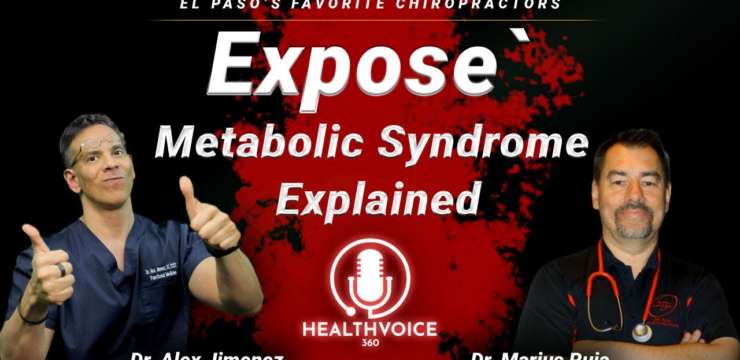Introduction The body provides many functions to make a person go through the day. From the body’s own metabolism to the endocrine system all the…

Metabolic Syndrome: Is a group of conditions that include increased blood pressure, high blood sugar, excess body fat around the waist, and abnormal cholesterol or triglyceride levels. These occur together, increasing an individual’s risk of heart disease, stroke and diabetes. Having just one of these conditions doesn’t mean an individual has metabolic syndrome. However, any of these conditions increase the risk of serious disease. Having more than one of these might increase the risk even more. Most of the disorders associated with metabolic syndrome have no symptoms. However, a large waist circumference is a visible sign. If an individual’s blood sugar is very high, they might have signs and symptoms of diabetes, which include increased thirst, urination, fatigue, and blurred vision. This syndrome is closely linked to overweight/obesity and inactivity. It’s also linked to a condition called insulin resistance. Normally, the digestive system breaks down foods into sugar (glucose). Insulin is a hormone made by the pancreas that helps sugar enter the cells to be used as fuel. People with insulin resistance, their cells don’t respond normally to insulin, and glucose can’t enter the cells as easily. As a result, glucose levels in the blood rise despite the body’s attempt to control the glucose by churning out more and more insulin. In some cases, metabolic syndromes can be caused by inflammation. Health coaches along with other functional practitioners can work with patients to decrease inflammation in the body.

Introduction The body provides many functions to make a person go through the day. From the body’s own metabolism to the endocrine system all the…

Introduction In the body, there are many systems that help it function properly, and one of them is hormones. Hormones are secreted through the endocrine…

Introduction Hormones in the body control the organs and the entire body system, from the endocrine system to the body’s temperature. When the hormones get…

Introduction In today’s podcast, Dr. Alex Jimenez DC* and Dr. Mario Ruja DC* explained what is basal metabolic rate, BMI, and BIA to the body…

Introduction In today’s podcast, Dr. Alex Jimenez and Dr. Mario Ruja discuss what metabolic syndrome is and the risk factors that associate with metabolic syndrome.…

In today’s podcast, Dr. Alex Jimenez DC, Health Coach Kenna Vaughn, Truide Torres, Alexander Jimenez, and Astrid Ornelas discuss and focus on a deeper look…

In today’s podcast, Dr. Alex Jimenez, health coach Kenna Vaughn, chief editor Astrid Ornelas discuss about metabolic syndrome from a different point of view as…

In today’s podcast, Dr. Alex Jimenez, health coach Kenna Vaughn, Astrid Ornelas, Truide Torres, and biochemist Alexander Isaiah Jimenez discuss what is metabolic syndrome and…
Adipocytes have extraordinary capacities and functions that promote homeostasis. Different adipocytes, such as white adipose tissue (WAT) and brown adipose tissue (BAT), possess multiple functions…

Obesity is an impactful disease favored by multiple factors with no signs of abating. Despite massive health campaigns and multiple dietary, surgical and pharmacological options…

Phase Angle is a helpful tool for health practitioners to identify the cell membrane’s integrity and dysfunction. In recent years, studies show an increase in patients with Metabolic Syndrome. Aside from the other health issues that metabolic syndrome induces, it increases oxidative stress and inflammation throughout the body. Oxidative stress promotes cellular damage.Â
Metabolic Syndrome
Metabolic Syndrome is a condition in which multiple health conditions occur together. Metabolic Syndrome increases an individual’s risk for heart disease, stroke, and type 2 diabetes. The conditions that make up metabolic syndrome include:Â
Increased blood pressure (>130/85mmHg)
High fasting blood glucose (>110mg/dL)
Excess body weight (men >40in, women >35in)
Low HDL (men <40mg/dL, women <50mg/dL)
Hypertriglyceridemia (>150mg/dL)Â
Although many individuals experience all of the conditions listed above, you only need to have three out of the five in order to be diagnosed with metabolic syndrome. Metabolic syndrome is often correlated with age, inflammation, obesity, and diabetes. The risk of developing metabolic syndrome increases the older you get and your rate of physical activity. If you become less active, your risk of developing metabolic syndrome will rise.Â
[embedyt] www.youtube.com/watch?v=deH1uzXA1ik%5B/embedyt%5DÂ
Phase AngleÂ
Phase angle is how health care professionals can monitor the integrity of cellular membranes. If the phase angle begins to decline, it has been linked directly to a decline in overall health. Similar to if phase angle increases, overall health is increasing. The integrity of cellular membranes is essential as cell survival depends on solid membranes. When the cellular wall is weak, it can collapse. From here, it is difficult for the body to take up the proper nutrients it needs. Additionally, with a weak cellular membrane, the cell is left with little to no protection from outside invaders.Â
We monitor a patient’s phase angle with the use of the InBody 770. This advanced machine allows us to not only track the phase angle of our patients but many other areas of their health as well, including but not limited to intracellular and extracellular water.Â
[embedyt] www.youtube.com/watch?v=WwbIsPNUYqs%5B/embedyt%5DÂ
Increasing Phase Angle & Decreasing Metabolic Syndrome
There are simple steps individuals can take every day to begin to improve their phase angle as well as decrease their risk of developing metabolic syndrome. These lifestyle changes include:Â
Exercising for a minimum of 30 minutes a day (as simple as walking)Â
Adding in a vegetable and fruit to every meal or snackÂ
Getting adequate protein and whole grains
Limiting saturated fat and salt intakeÂ
Not smokingÂ
Maintaining a healthy weightÂ
Adequate sleep for proper cellular healingÂ
IN THE RECENT YEAR, THERE HAVE BEEN MORE PATIENTS WHO ARE DIAGNOSED WITH METABOLIC SYNDROME. WHEN CAUGHT EARLY, THERE ARE MULTIPLE WAYS TO COMBAT THIS DIAGNOSIS HOLISTICALLY AND NATURALLY. WITH THE ABILITY TO CREATE PERSONALIZED TREATMENT PLANS INVOLVING EXERCISE, DIET, AND NATURAL SUPPLEMENTS, WE SEE AN INCREASE IN PATIENT’S OVERALL PHASE ANGLE. -KENNA VAUGHN, ACSM-EP, SENIOR HEALTH COACH
References:Â
de Luis DA, Aller R, Romero E, Dueñas A, Perez Castrillon JL. Relation of phase angle tertiles with blood adipocytokines levels, insulin resistance and cardiovascular risk factors in obese women patients. Eur Rev Med Pharmacol Sci. 2010 Jun;14(6):521-6. PMID: 20712259.Â
Huang PL. A comprehensive definition for metabolic syndrome. Dis Model Mech. 2009 May-Jun;2(5-6):231-7. doi: 10.1242/dmm.001180. PMID: 19407331; PMCID: PMC2675814. Â
Additional Online Links & Resources (Available 24/7)


Â
Online Appointments or Consultations:  https://bit.ly/Book-Online-Appointment


Â
Online Physical Injury / Accident Intake Form: bit.ly/Fill-Out-Your-Online-History


Â
Online Functional Medicine Assessment: bit.ly/functionmed
Â
Disclaimer
Â
The information herein is not intended to replace a one-on-one relationship with a qualified health care professional, licensed physician, and is not medical advice. We encourage you to make your own health care decisions based on your research and partnership with a qualified health care professional. Our information scope is limited to chiropractic, musculoskeletal, physical medicines, wellness, sensitive health issues, functional medicine articles, topics, and discussions. We provide and present clinical collaboration with specialists from a wide array of disciplines. Each specialist is governed by their professional scope of practice and their jurisdiction of licensure. We use functional health & wellness protocols to treat and support care for the musculoskeletal system’s injuries or disorders. Our videos, posts, topics, subjects, and insights cover clinical matters, issues, and topics that relate and support, directly or indirectly, our clinical scope of practice.* Our office has made a reasonable attempt to provide supportive citations and has identified the relevant research study or studies supporting our posts. We provide copies of supporting research studies available to regulatory boards and the public upon request. We understand that we cover matters that require an additional explanation of how it may assist in a particular care plan or treatment protocol; therefore, to further discuss the subject matter above, please feel free to ask Dr. Alex Jimenez or contact us at 915-850-0900.  Read More…
Dr. Alex Jimenez DC, MSACP, CCST, IFMCP*, CIFM*, CTG*
email: coach@elpasofunctionalmedicine.com
phone: 915-850-0900
Licensed in Texas & New Mexico

Anthropometric Assessment Anthropometric measurement plays a principal role in the patient’s health assessment. Anthropometric measures are an essential part of our clinical findings; body composition…

A healthy microbiota is considered to have rich biodiversity and functions symbiotically with its host to promote wellness. However, dysbiosis is widely associated b a…

Omega-3 polyunsaturated fatty acids (PUFA) are considered essential because our body cannot synthesize them. The two most common long-chain omega-3 acids are called eicosapentaenoic acid…

Chocolate is most of the time cut off the diet of people dealing with overweight. Indeed, high caloric foods are often a contributing factor in…

Insulin resistance is a problem that is strongly associated with obesity due to excess body fat and diabetes. However, growing evidence suggests that gut microbiota…

Oxidative stress is a critical factor in cardiometabolic conditions. As previously demonstrated by the PREDIMED study, high-risk CVD patients have low antioxidant enzymatic activity and…